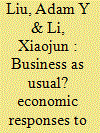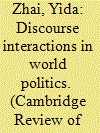|
|
|
Sort Order |
|
|
|
Items / Page
|
|
|
|
|
|
|
| Srl | Item |
| 1 |
ID:
165981


|
|
|
|
|
| Summary/Abstract |
What is the relationship between political tensions and economic relations? In this study, we explore this question by examining how Japan’s nationalization of the Diaoyu/Senkaku Islands, a territory much disputed with China, has affected bilateral trade between the world’s second and third largest economies. Using monthly data, we find that the nationalization imbroglio has negatively affected the amount of goods Japan exports to China, with the effect being most pronounced for highly salient and visible products such as automobiles and cameras; these experienced immediate and dramatic drops lasting up to 12 months. In contrast, raw materials and intermediate goods were not affected at all; some even experienced increased exports. These findings suggest that consumer and corporate responses to political tensions may follow different logics. For consumers, certain political tensions, especially those involving enduring territorial disputes, could override entrenched economic interests and preferences, at least in the short term. In these instances, it will no longer be business as usual.
|
|
|
|
|
|
|
|
|
|
|
|
|
|
|
|
| 2 |
ID:
183519


|
|
|
|
|
| Summary/Abstract |
Discourse, as a constructive power, plays a significant role in world politics. Rather than focusing on the formation or transformation of a single discourse, we investigate discourse interaction in the context of multiple competing discourses. Based on the theories of discourse interaction, this study analyses the realist dimension of discourse by examining the territorial dispute between China and Japan over the Diaoyu/Senkaku islands and shows how the two countries use discourses to pursue their own security and respective realist interests. This analysis identifies five major controversies in the two countries’ discourses on their claims of sovereignty over the islands and demonstrates that each of the two states uses both complementary and competing discourses to strengthen its own stance and delegitimize the other’s claims. The theoretical analysis of discourse interaction not only contributes to the growing research on discourse practices in IR, but also has important implications for practice-oriented strategic communication.
|
|
|
|
|
|
|
|
|
|
|
|
|
|
|
|
| 3 |
ID:
166579


|
|
|
|
|
| Summary/Abstract |
This article seeks to determine why the illegal wildlife trade is still flourishing in China despite the country’s adoption of the Convention on International Trade in Endangered Species of Wild Flora and Fauna (CITES). It focuses on the 1989 international trade ban on African elephant ivory. Taking a normative social constructivist approach, the article illuminates the motivations for, and processes and consequences of, accommodating novel norms in domestic situations. In addition, China is compared with Japan to ensure both methodological rigour and wide empirical coverage. It is argued that, although species protection has been adopted as a legitimate transnational norm, it has not been sufficiently socialized into Chinese (or Japanese) society. Rather, related local issues and social, cultural and economic factors play crucial roles in driving ivory demand and trade. Thus, despite the adoption of a relevant regulatory framework, illegal wildlife trade has become a serious problem in today’s highly commercialized Chinese (and Japanese) society. This problem can be solved only by conforming to international conservation norms and implementing stringent regulations and effective governance.
|
|
|
|
|
|
|
|
|
|
|
|
|
|
|
|
|
|
|
|
|